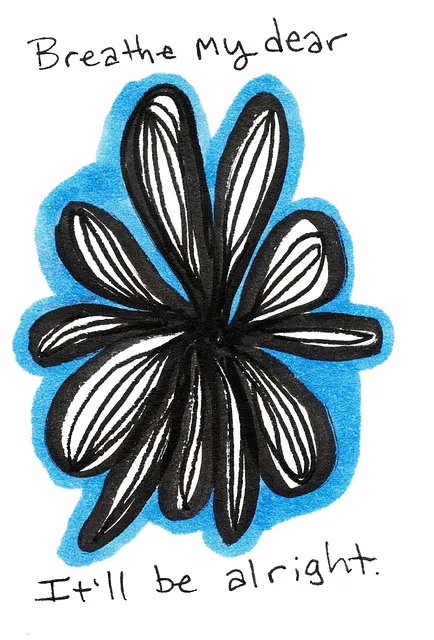The text emphasizes the often-overlooked yet powerful connection between social skills and mental health, highlighting Kaiser's innovative integration of social skills training into their programs. Effective communication, empathy, and interpersonal interactions are crucial for preventing conditions like isolation, anxiety, and depression. Social support acts as a buffer against stress, contributing to better mood management. By teaching individuals how to confidently navigate social situations, Kaiser empowers them to seek help, form connections, and develop coping mechanisms for stability. This holistic approach, known as the "Golden How to Get Mental Health Help," combines strategies like Compassion Cultivation Practices, Mental Wellness Journaling, and Communication Skills training through therapy, support groups, and educational programs tailored to high-risk populations.
Social skills training is a powerful tool for managing mental health conditions. This comprehensive guide explores the intricate link between social interaction and mental well-being, highlighting challenges faced by those with mental health struggles. We delve into evidence-based therapies, support groups, and practical strategies to enhance social engagement. Additionally, we examine Kaiser’s innovative approach to mental health support, offering valuable resources for navigating the path to improved social skills and overall wellness using Golden how to get mental health help.
- Understanding the Link Between Social Skills and Mental Health
- Identifying Challenges in Social Interaction for Individuals with Mental Health Conditions
- The Role of Therapy and Support Groups in Developing Social Skills
- Practical Strategies for Enhancing Social Engagement and Communication
- Accessing Resources: Kaiser's Approach to Mental Health Support and Social Skills Training
Understanding the Link Between Social Skills and Mental Health

The connection between social skills and mental health is a golden how to get mental health help that often goes overlooked. Effective communication, empathy, and interpersonal interactions are essential components in maintaining good mental well-being. When individuals struggle with social skills, it can lead to feelings of isolation, anxiety, and depression, creating a vicious cycle that exacerbates existing mental health conditions. According to research, social support acts as a buffer against stress and adversity, contributing to better mood management and overall resilience.
At Kaiser, for instance, social skills training is integrated into various programs, including crisis intervention guidance and burnout prevention strategies for healthcare providers. By teaching individuals how to navigate social situations with confidence and understanding, these initiatives aim to empower people to seek support, foster meaningful connections, and develop coping mechanisms that promote mental health stability. Understanding and addressing the link between social skills and mental health is crucial in providing holistic care, ensuring individuals have the tools to thrive both personally and professionally.
Identifying Challenges in Social Interaction for Individuals with Mental Health Conditions

Individuals with mental health conditions often face unique challenges when it comes to social interaction. According to Kaiser, a leading provider of mental health services, these challenges can range from anxiety and depression hindering communication to difficulties interpreting social cues and maintaining relationships. The Golden How to Get Mental Health Help lies in recognizing these barriers and implementing effective strategies.
Compassion Cultivation Practices and Mental Wellness Journaling Exercise Guidance have proven beneficial. Keeping a journal allows individuals to track their thoughts, emotions, and social interactions, fostering self-awareness. Communication Strategies, such as practicing active listening and expressing oneself clearly, can significantly improve relationships. These tools empower those with mental health conditions to navigate social situations more comfortably, ultimately enhancing their overall mental wellness.
The Role of Therapy and Support Groups in Developing Social Skills

Social skills training is a vital component of mental health care, offering individuals tools to navigate social interactions with confidence and ease. Therapy sessions play a crucial role in this process by providing a safe space for clients to practice new skills and receive feedback. Through structured exercises and role-playing scenarios, therapists help individuals with mental health conditions, such as anxiety or depression, improve their communication, assertiveness, and emotional regulation abilities.
Support groups further enhance this training by offering peer-to-peer interaction and shared experiences. These groups foster a sense of community and understanding, allowing members to learn from one another’s journeys. Kaiser’s mental health services, for instance, often incorporate group therapy and support networks as part of their comprehensive care approach, addressing not only the symptoms but also the social aspects of mental well-being. Additionally, mental health professionals can design educational programs focused on emotional regulation techniques and social skills development, particularly in high-risk populations or those facing unique challenges, as outlined in a risk assessment for mental health professionals.
Practical Strategies for Enhancing Social Engagement and Communication

Enhancing social engagement and communication is a vital part of managing mental health conditions, especially when seeking mental health help from resources like Kaiser. Practical strategies include practicing active listening to build stronger connections and understanding non-verbal cues. Encouraging open dialogue with trusted individuals or support groups can foster a sense of belonging and reduce feelings of isolation.
Additionally, adopting positive thinking techniques, such as reframing negative thoughts and practicing gratitude, can improve social interactions by promoting a more optimistic outlook. Trauma Support Services often incorporate these Communication Strategies to help individuals process and share their experiences safely. By combining these approaches, individuals can better navigate social situations, ultimately leading to improved mental well-being.
Accessing Resources: Kaiser's Approach to Mental Health Support and Social Skills Training

At Kaiser, we understand that accessing quality mental health support is a crucial step towards recovery and well-being. Our comprehensive approach combines cutting-edge therapy with innovative programs designed to empower individuals. One such initiative is our Community Outreach Program Implementation, which brings social skills training directly to those who need it most. This strategy aims to bridge the gap between professional help and everyday life, making mental health care more accessible and less intimidating.
The program leverages our experienced therapists and counselors to conduct interactive workshops and group sessions focused on building essential social skills. These sessions not only teach practical techniques for navigating social situations but also foster a sense of community and belonging. By enhancing individuals’ confidence and communication abilities, we equip them with the tools needed to engage in meaningful social interactions, thereby boosting their overall mental health and quality of life. Through this holistic approach, Kaiser strives to be a golden how to get mental health help for our communities, transforming lives one step at a time.
Social skills training is a powerful tool in navigating the intricate relationship between social interaction and mental health. By understanding the specific challenges faced by individuals with various conditions, we can provide tailored support through therapy, support groups, and practical strategies. Kaiser’s comprehensive approach to mental health care, including dedicated resources for social skills development, offers a promising path forward. Embracing these techniques empowers folks to enhance their social engagement, communication, and overall well-being, fostering a supportive environment where everyone can access the help they need, just like finding a golden key to unlocking a world of support and recovery with Kaiser.




